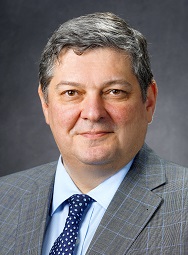
Tudor G. Jovin, MD
Cooper University Health Care recently became the first hospital in the world to use a new virtual reality (VR) system for patient rehabilitation following a stroke, announced Tudor G. Jovin, MD, chief and chairman of the Cooper Neurological Institute, and internationally renowned neurologist and researcher.
Prior to the commercial launch of The REAL™ Immersive System, a team of physicians and therapists at the Cooper Neurological Institute (CNI) worked closely with California-based medical device producer, Penumbra, in the research and development phase for the new system. Field tests at Cooper were instrumental in refining the technology for patient use.
“As an academic health system and a leading provider of advanced stroke and neurological services, we are committed to adding promising new treatment modalities to our complement of therapies,” said Dr. Jovin. “Virtual Reality is an emerging new approach to treatment in stroke rehabilitation settings. We are proud of our role in the development of this new system and are excited to be the first hospital in the world to use it with our patients.”
The REAL™ Immersive System is a fully immersive virtual reality system that displays and tracks upper-extremity rehabilitation in interactive exercises for adult patients using a combination of virtual environments and full presence tracked avatars for visual feedback. For the patient this means they are able to adjust their view of the virtual world by simply looking around. With the addition of accurately tracked hand controllers, the patient can also intuitively move their avatar and interact in the world achieving the sensation of actually being there rather than just observing.
These rehabilitation exercises are conducted in a seated position in a clinical environment closely supervised by a medical professional trained in rehabilitation therapy, according to Penumbra.
The system features a wireless head-mounted display and a series of sensors that are placed on the patient’s body. Using a handheld tablet device, a trained therapist can choose from a series of game-like interactive activities that prompt the patient to move their arms. The sensors have mechanical and electrical components that can measure the patient’s motion and direction in the physical space and then translate that information into a virtual environment.
“The therapist watches the patient maneuver through the exercises on the tablet in real-time and can increase or decrease the level of difficulty of the activities depending on the patient’s progress,” said Dave Owens, director of Rehabilitation Services at Cooper. “The system monitors and securely records objective data for the patient’s record.”
“I was excited when Dr. Jovin first proposed the idea of partnering with Cooper to test and refine the REAL System,” said Adam Elsesser, Chairman and CEO of Penumbra, Inc. “The team at Cooper helped to clearly demonstrate the usefulness of the REAL System to patients and care providers in both the inpatient care and eventually the outpatient rehabilitation settings. We look forward to continuing the partnership as we learn more about how this product impacts patient recovery and therapy delivery.”
The Penumbra system differs from other versions of VR systems in that it is completely mobile and wireless. Everything needed for use with a patient is contained in a simple, portable, charging case. Yet its customized hardware and software can track the upper body’s full range of motion, and the experience is three-dimensional or fully immersive so the therapeutic exercises feel “real” to the patient. Immersive activities have been shown to stimulate rewiring within the brain following brain injury, including injury produced by stroke.

Rohini J Kumar, MD
“Following a stroke, task-oriented exercises can help the brain rewire itself and form new neural connections, a concept known as neuroplasticity,” explained Rohini J. Kumar, MD, a Physical Medicine and Rehabilitation physician at Cooper. “We want to enhance a patient’s motor recovery by focusing on stimulating exercises that are both purposeful and engaging. With the help of Penumbra and the REAL system, we will be able to augment the patient’s recovery from bedside to our outpatient clinics. We are excited to see the potential of VR in our stroke patients and other neurologic conditions.”
Cooper’ Neurological Institute is fully dedicated to the comprehensive diagnosis and treatment of neurological and neurosurgical issues. In February 2019, Dr. Jovin joined Cooper University Health Care as chief and chairman of Cooper Neurological Institute. Under his leadership, the Cooper Neurological Institute has already enjoyed significant growth with the recruitment of new physicians and institution of new treatment paradigms.
Cooper’s Neurological Institute Stroke Program recently earned re-certification of The Joint Commission’s Gold Seal of Approval® and the American Heart Association/ American Stroke Association’s Heart-Check mark as an advanced comprehensive stroke center, a prestigious designation reserved for institutions with specific abilities to receive and treat the most complex stroke cases. Learn more about the new VR system at Cooper.
Learn more about the REAL Immersive System at www.realsystem.com.
###
Contact: Wendy A. Marano
Cooper University Health Care
856.382.6463
marano-wendy@cooperhealth.edu
